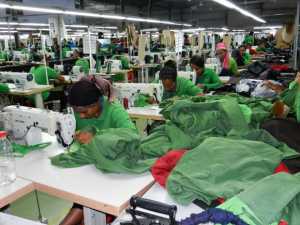- Stay Connected
Chinese, South Korean, Indian apparel makers landing in Ethiopia

Addis Ababa, July 17, 2017 (FBC) – Ethiopia is fast developing into a dynamic apparel-sourcing hub as low labor costs lure international clothing makers to the African nation.
Manufacturers from China, South Korea, India and other countries have opened new plants in the continent’s second most populous nation while a growing number of European and U.S. brands are sourcing garments there.
A significant factor in Ethiopia’s emergence on the clothing scene is the planned opening of a new railway line to a port in neighboring Djibouti, located on the Horn of Africa in the Arabian Sea.
The railway will facilitate transport of goods from the landlocked country’s industrial areas, like the Bole Lemi Industrial Park, an hour’s drive from the capital Addis Ababa.
Opened in 2015, the sprawling 150-hectare park is bustling with Chinese, Taiwanese and South Korean production facilities, conveniently clustering factories for textiles, apparel products and leather shoes in one area.
At a factory operated by Shin Textile Solutions, a South Korean company, workers sit at long rows of machines sewing mainly sportswear. According to the general manager, the plant’s entire output is exported, with about 60% going to Europe, 20% to the U.S. and the remainder to Asia.
Japan’s Fast Retailing, which manufactures and sells casual clothes under the Uniqlo brand, is among the many apparel makers that have shown interest in the plant, the manager said.
Drive to industrialize
Ethiopia’s main exports currently include coffee, gold and leather products, but the government is stepping up efforts to develop new industries. Arkebe Oqubay, special adviser to Prime Minister Hailemariam Desalegn, has pledged to transform Ethiopia from a farm economy into an industrial powerhouse.
As part of its efforts to turn the country into a thriving, middle-income economy by 2025, the government has been building industrial parks. The newest is Hawassa Industrial Park, a one-hour flight from the capital. Among the 15 companies with manufacturing facilities there is PVH, a U.S. apparel company.
PVH’s 280 employees produce garments for a number of international brands including Calvin Klein, and then export them to Europe and the U.S.
Ethiopia’s low labor costs make it an attractive garment-sourcing destination, according to the company. The average monthly pay for a factory worker is about 50 US dollars, compared with 140-160 US dollars in Kenya, 70-90 US dollars in Bangladesh, 150-170 US dollars in Vietnam and 400-500 US dollars in China.
With a population hovering around 100 million, Ethiopia is the second most populous nation in Africa after Nigeria. The country’s young, low-wage workforce gives it the potential to grow into a major garment-sourcing hub with a vibrant market.
Another factor in favor of the country becoming a bigger manufacturer is its fast-developing infrastructure. The inland nation used to depend heavily on trucking, hindering its transition to a more export-oriented economy. But the new railway connecting Addis Ababa to Djibouti will solve this problem.
The government has built a distribution center in the Addis Ababa suburb of Mojo, where there is also a train station on the new line. Goods from Ethiopia’s industrial parks will be sent to the Port of Djibouti via the center.
Previously, it took three days to transport goods by truck from Addis Ababa to Djibouti. The railway will cut this to about nine hours.
Attracting more business
Currently, companies targeting Ethiopia are mostly apparel makers and other light industry players. But General Electric plans to manufacture medical equipment in the country, and Samsung Electronics is working with a local partner to produce printers.
Meanwhile, Hyundai Motor reached an agreement with a local company in May regarding construction of a plant to assemble commercial vehicles.
China has also been a leading investor in Ethiopia, as in other parts of Africa. The Ethiopian prime minister attended the May international conference on China’s Belt and Road Initiative in Beijing, during which he delivered a speech as the African representative.
The inclusion of Ethiopia at the conference indicates the importance China places on the country as a key regional transportation and production hub.

One Response to Chinese, South Korean, Indian apparel makers landing in Ethiopia